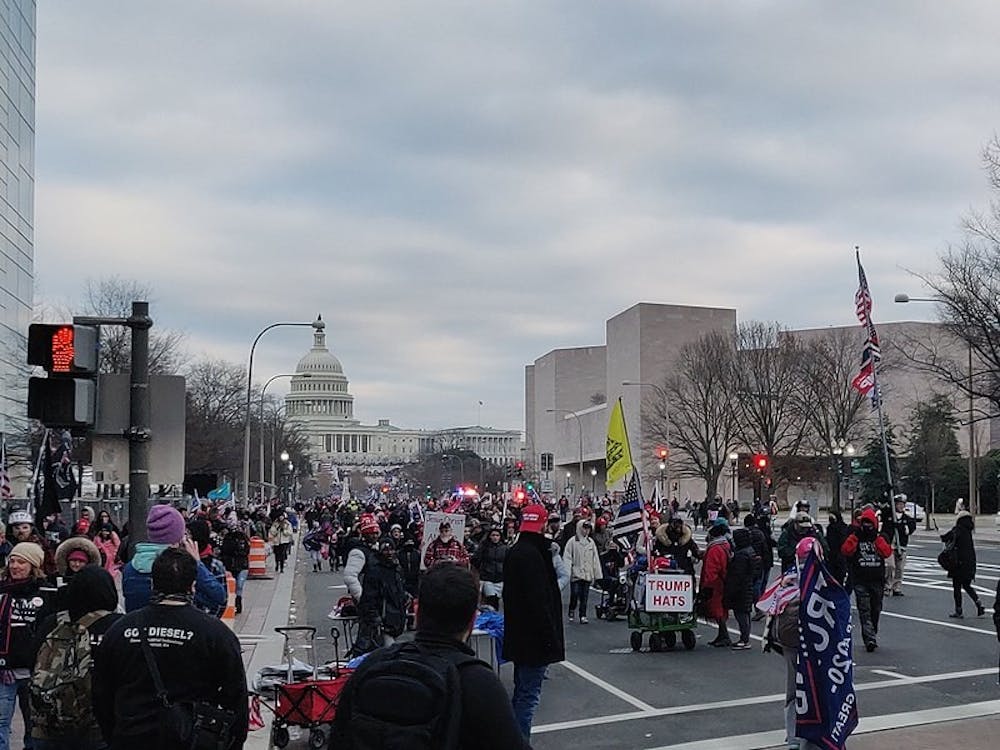中文版请点击此处 // Lea en español
The First Amendment is at the foundation of our democracy, guaranteeing fundamental rights like the freedom of religion, speech, press, petition and assembly. The events of Jan. 6 were premeditated violent attacks on several protected ideals — including the right to freedom of the press. In the aftermath of the insurrection, the words “Murder the Media” were found written on the entrance of the Capitol doors, several journalists were harassed and threatened and a group of rioters made a noose from media equipment.
These are not isolated events. Over the past few months, several acts of violence have been committed against journalists following the 2020 Presidential election results. These acts of violence against the media are shocking in a country that prides itself on protections for the press. Around the world, violent acts like these are not unfamiliar. At least 50 journalists died abroad in 2020. This statistic is sickening, and we as Americans cannot allow this violence and stifling of the media within our own borders.
In contrast to the recent violence, verbal criticism of the media is not a novel concept in American politics. This criticism increasingly became problematic in the final months of the Trump administration. This includes prominent conservative voices claiming mistreatment from the media over alleged liberal bias. Former President Donald Trump had often criticized the media for having a perceived liberal bias. On numerous occasions Trump had referred to facts he disagreed with as “fake news.” Instead of upholding the First Amendment, Trump had even gone as far as to refer to the media as “the enemy of the people.” Trump is not alone in criticizing the media. Prominent politicians such as former Alaskan Gov. Sarah Palin have blamed the media for the Capitol insurrection. It is ironic that right wing leaders call for more transparency and equal treatment of conservitive politics by the “liberal media'' but attempt to squash these same protections when discussing liberal-leaning news sources.
In tackling the claim of “liberal bias” we must acknowledge that the media in America — at least in the modern age — is naturally biased. However, the specific political leanings of the media, whether liberal or conservative, are accessible to the public through a simple internet search. For decades journalists were educated and tasked with uncovering and reporting news. However, more than 78 percent of Americans today under the age of 50 receive their news from social media. As successive generations become more and more dependent on the internet for news, freedom of the media and, specifically, of social media, is more important than ever.
And yet, Trump attacked social media companies such as Twitter and Facebook on multiple occasions. He even sought to amend the controversial internet expression law Section 230. Specifically, Trump expressed a grievance over fact checkers placed on his tweets when he falsely claimed mail in ballots can increase fraudulence. Concerns that voter fraud had occurred during the 2020 election had been repeatedly fact checked and were confirmed to be false. Trump however, called the use of fact checkers one of the greatest dangers to free speech and sought to redefine section 230 for that reason. Whether or not people trust or feel these companies are qualified to be fact checkers, these companies are within their rights to do so. Likewise, users must conform to the terms and conditions they agreed to upon creating a social media account. However, these should not be a cause for concern. The legal protections and the limits of the First Amendment including freedom of speech, also apply to social media companies. Disturbingly, freedom of speech is also under attack by right-wing extremist groups.
The existing limits on free speech are in place to protect against violence, which is ironic for Trump and his extremist supporters. In the past he had expressed the desire to usurp his powers to “legally” shut down Twitter which comes with irony, as his account was recently and permanently locked for inciting violence. If one truly believes in protecting the First Amendment, they would defend the right to give an opposing perspective, except when such speech incites violence or spreads malicious falsehoods. Right wing extremists continued to spread falsehoods over a stolen election, and claiming the Capitol insurrection was an attack by the left extremist group ANTIFA. Trump had severely overstepped the boundaries of his political powers, instigating his supporters to attack the U.S. Capitol. Though Trump was acquitted in the impeachment process, it is impossible to deny the fact that Trump has ignited the seeds of hate and violence that have always existed in America. These ideals have instigated extremist groups who continue to pose a threat to the First Amendment despite the change in administration.
The First Amendment must continue to be protected. Journalists should not allow potential threats to suppress their protected right to publicize the news and voice their opinions. Furthermore, as American citizens, we must consult multiple sources and research before sharing posts on social media. This prevents the spread of false information that can incite extremist viewpoints and cause harm. We must work to reconcile with opposing opinions and protect the truth from lies that can cause violence. Words can be powerful tools to communicate information across the globe, and can inspire the best in humanity, but they also have the power to incite hate and bring out the worst in us. As Americans we can and will do better. The healing and unity of our nations depends on it.
Yssis Cano-Santiago is a Viewpoint Writer for The Cavalier Daily. She can be reached at opinion@cavalierdaily.com.
The opinions expressed in this column are not necessarily those of The Cavalier Daily. Columns represent the views of the authors alone.







